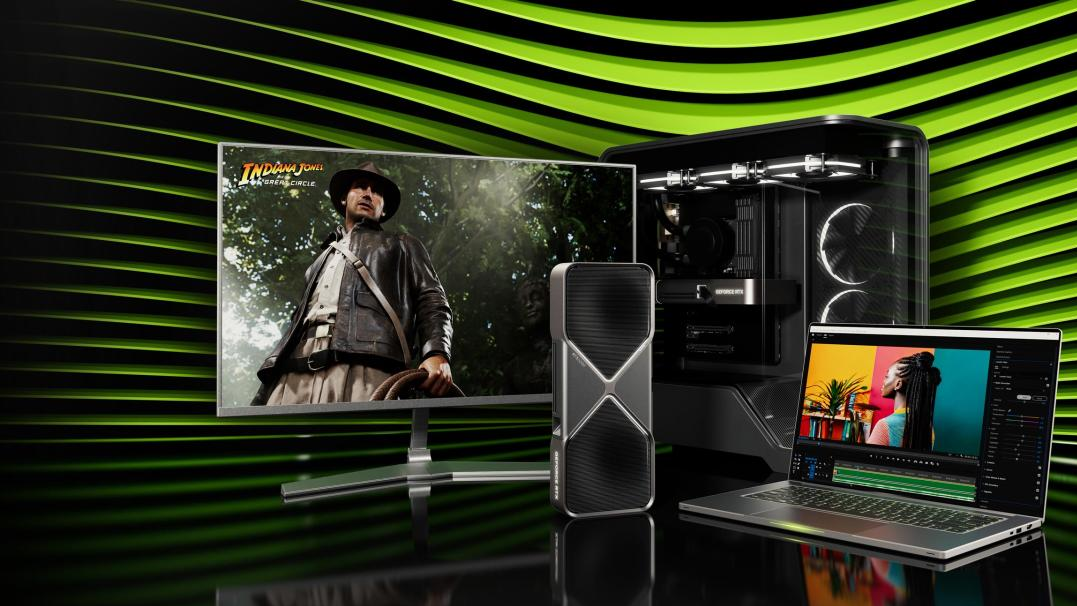In tandem with (briefly) becoming the most valuable company in the world, NVIDIA announced its new, long-awaited Blackwell family of graphic cards. CEO Jensen Huang took to the CES 2025 stage to detail that the first batch of RTX 50 series GPUs will arrive in January, with pricing starting at $549 for the RTX 5070 and capping at a whopping $1,999 for the flagship RTX 5090. The mid-tier models are the $749 RTX 5070 Ti and $999 RTX 5080. Laptop versions of the desktop GPUs will be available in March, starting at $1,299 for 5070-equipped PCs.
As for specs, the RTX 5090 Founders Edition will feature 32GB of GDDR7 RAM and 21,760 CUDA cores. Depending on the game, NVIDIA says the 5090 will deliver as much as twice the relative performance, with RT-intensive titles like Alan Wake 2 and Cyberpunk 2077 seeing the largest gains. In the latter, for instance, NVIDIA shared a video that showed the game running at 242 frames per second on the 5090 compared to a relatively paltry 109 fps on the RTX 4090.
Of course, the performance uplift consumers can expect will depend, in large part, on whether a game supports NVIDIA’s new DLSS 4. The tech can generate up to three additional frames for every one frame the GPU renders with traditional rendering techniques. Looking at the performance charts NVIDIA shared, games that are limited to DLSS 3 will see a smaller performance boost. However, the good news is that older RTX GPUs will support DLSS 4, though the tech’s killer feature, multi-frame generation, will be exclusive to the company’s new 50 series cards.
Okay, but what about the RTX 5070, you ask? It will boast 6,144 CUDA cores and 12GB of GDDR7 memory (I can already hear groaning in the comments section). With DLSS 4, NVIDIA claims the 5070 will be as fast as the 4090. Again, it’s important to stress those gains will come courtesy of DLSS 4, and rasterization gains, if there are any, will be far more modest. As for the 5070 Ti, the company says it’s up to two times faster than the 4070 Ti.
We knew going into tonight that the 50 series family would almost certainly be power hogs, and that proved to be true. On the top end, NVIDIA recommends a 1,000-watt PSU for the 5090 due to its 575 watts of total graphics power. If there’s a silver lining, it’s that all the new Founders Edition cards feature two-slot designs.
RTX 5090
RTX 5080
RTX 5070 Ti
RTX 5070
RTX 4090
Architecture
Blackwell
Blackwell
Blackwell
Blackwell
Lovelace
CUDA cores
21,760
10,752
8,960
6,144
16,384
AI TOPS
3,352
1,801
1,406
988
1,321
Tensor cores
5th Gen
5th Gen
5th Gen
5th Gen
4th Gen
RT cores
4th Gen
4th Gen
4th Gen
4th Gen
3rd Gen
VRAM
32 GB GDDR7
16 GB GDDR7
16 GB GDDR7
12 GB GDDR7
24 GB GDDR6X
Memory bandwidth
1,792 GB/sec
960 GB/sec
896 GB/sec
672 GB/sec
1,008 GB/sec
TGP
575W
360W
300W
250W
450W
NVIDIA kicked off the Blackwell portion of its CES presentation with a demo of a next-generation Assassin’s Creed game featuring the most realistic ray-traced graphics the series has ever featured. “All of this, with AI, is the house that GeForce built,” said Huang, wearing a new snakeskin-like jacket instead of his signature leather jacket. “Now, AI is coming home to GeForce.”
Be sure to visit Engadget in the coming days as we’ll have more on NVIDIA’s new GPUs then.



